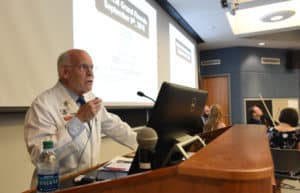Visiting Lecturer: Swelling Key to Diagnosing Mozart’s Death
| Sept. 19, 2018 | At 35, Mozart was feeling well and was as productive as ever, then a sudden illness killed him less than two months before his 36th birthday. The cause of death has been the subject of speculation ever since, with more than 100 proposed diagnoses.

Internal Medicine Chair James D. Marsh, M.D., introduces the Quapaw String Quartet, which for the first time accompanied the Ackerman Visiting Professorship Grand Rounds, this year featuring Philip A. Mackowiak, M.D., and his theory on Mozart’s cause of death.Johnpaul Jones
Philip A. Mackowiak, M.D., MBA, was invited to UAMS to lecture about his theory of Mozart’s cause of death. The emeritus professor of medicine from the University of Maryland School of Medicine spoke at the UAMS College of Medicine 14th annual George L. Ackerman M.D., Visiting Professor Internal Medicine Grand Rounds.
The event marked a couple of firsts for the grand rounds: It was the first time it has hosted an historical clinical pathological lecture and the first time with accompaniment by the Quapaw String Quartet from the Arkansas Symphony Orchestra.
Mackowiak’s lecture, “Mozart’s Fatal Anasarca,” followed the quartet’s performance of one of Mozart’s early string quartets, Herschel 159. It was composed by Mozart when he was 17.
Why the interest in Wolfgang Amadeus Mozart’s death?
“The Quapaw Quartet told us the answer to that better than I could possibly articulate,” Mackawiak told the medical professionals and students packing the Rahn Building auditorium. “His music is just sublime, to say the least.”
Mozart’s extraordinary talent was evident at age 3, when he was playing the harpsichord, and age 4, when he was composing quartets. He also overcame numerous debilitating conditions and diseases, including malnutrition as an infant, typhoid fever, rheumatic fever, smallpox and hepatitis, yet he managed to compose a total 626 works, including 22 operas, before he died.
Some of the more popular theories about his cause of death include poisoning, syphilis and trichinosis.

The Quapaw String Quartet performed before and after Mackowiak’s lecture to a standing-room-only audience.
“We’ll never know for certain what was the specific culprit that carried him off,” Mackawiak said, although he made a case for Streptococcus equi, a type that can infect humans through consumption of unpasteurized milk and cheese.
Streptococcus equi would account for Mozart’s symptoms – particularly the massive swelling all over his body (anasarca/edema) – that made him unrecognizable according to those who saw him before and after he died, Mackowiak said. A local physician at the time wrote that Mozart had the same symptoms as other residents, indicating an epidemic. In addition, a 2009 investigation of the Vienna Daily Register of Deaths for the winter of 1791 showed a spike in deaths from edema, also indicating an epidemic disorder.
Mackowiak has authored two related books: Post Mortem: Solving History’s Great Medical Mysteries, and Diagnosing Giants: Solving the Medical Mysteries of Thirteen Patients Who Changed the World.
The Quapaw String Quartet closed the grand rounds lecture with one of Mozart’s later movements.
James D. Marsh, M.D., chairman of the Department of Internal Medicine, College of Medicine, said the collaboration with the Arkansas Symphony for the lecture was made possible by Robert W. Bradshear, M.D., professor and director of the Division of Infectious Diseases in the Department of Internal Medicine, and Richard P. Wheeler, M.D., executive associate dean for Academic Affairs in the College of Medicine.
“One of the main points of this professorship is the humanities, and we thought we could bring it to life this way,” Marsh said.

The Arkansas Symphony’s Quapaw String Quartet performed Herschel 159, a movement composed by Mozart when he was 17.
Ackerman Background
The George Link Ackerman Visiting Professorship in Internal Medicine honors the now professor emeritus for having always been an exemplary model of the physician educator. He graduated cum laude from UAMS in 1954, and following an internship at Philadelphia General Hospital and service in the U.S. Navy, he returned to UAMS to complete his residency in internal medicine and his training in nephrology and in metabolic diseases.
Ackerman, a native Arkansan, has received numerous awards and has been frequently recognized as a consummately skilled clinician and exceptional teacher, known for his skillful practice of the Socratic mode of teaching.
He was the Honors Convocation speaker three times; recipient of a Golden Apple Award, an Outstanding Faculty Award from the internal medicine house staff, an Abernathy Award for Excellence in Internal Medicine from the Arkansas Chapter of the American College of Physicians, and the Arkansas Caduceus Club Distinguished Faculty Award. He received the Distinguished Service Award from UAMS and the UAMS Master Teacher Award in 1999. In 2000, he was named a Master of the American College of Physicians. In 2004, he received the Distinguished Alumnus Award and was named as Inaugural Member of the UAMS College of Medicine Hall of Fame.
Ackerman was active in the American College of Physicians, serving as governor for Arkansas 1987-1991. He has always been interested in literature and for many years organized an annual reading retreat for physicians.
